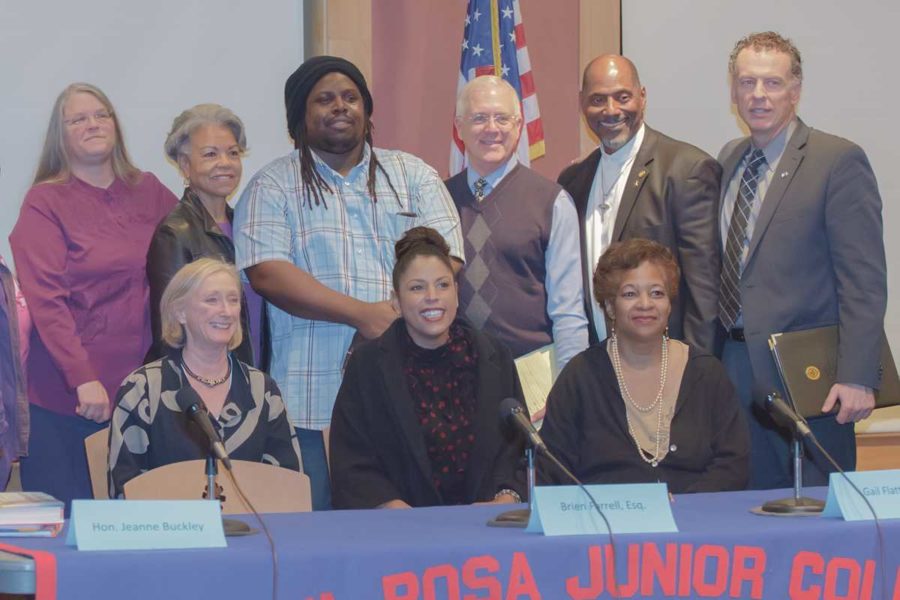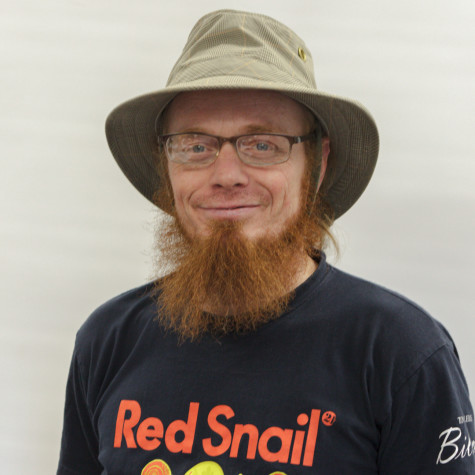A Black Lives Matter panel offered solutions on community policing including police wearing mandatory body cameras and increased public oversight Feb. 19 in the Bertolini Student center.
Lenita Marie Johnson moderated the panel and included leaders from the legal and law enforcement community. A diverse gathering of Santa Rosa Junior College students, administrators, community members and two SRJC Board of Trustee members attended the event, hosted by the SRJC Black Student Union.
Bay Area reggae artist Sky I opened the panel with his song, “Can’t Blame The Youths,” a tribute to 13-year-old Andy Lopez, whom a Sonoma County Sheriff’s deputy shot seven times in October 2013.
After the performance, there was a discussion about how to combat the police’s apparent lack of respect to black, brown and poor youths.
“Police in this country shoot and kill civilians, particularly black males, in far too high of numbers,” Johnson said. “All of those in law enforcement must be honest enough to admit that much of our history is not pretty.”
Johnson asked the panelists why they had decided to join the panel and discuss what he called “the American legacy called racism.”
Panelist Jeanne Buckley, retired Superior Court Commissioner and member of the Sonoma County Community and Local Law Enforcement Task Force, said that due to the proliferation of cameras, both on the police and the public, there is a much better view of what is happening in our communities.
“Now that the officers have cameras and people with their cellphones have cameras, we can see what we’ve been talking about for years and years and years and years. And it’s kind of nice to know that we haven’t been crazy all this time,” Buckley said.
Brien Farrell, another panelist who sits on the Task Force, said the community’s participation is essential. “We need community engagement if there’s going to be the kind of community policing that I think will lead to changes,” Farrell said.
Gail Flatt, a Santa Rosa attorney, said she accepted the invitation because she had strong feelings about the issue and wanted to be part of the dialogue.
SRJC district police chief Matt McCaffrey said he joined the panel to share with the public law enforcement’s perspective.
Santa Rosa attorney Nancy Palandati said she was there to talk about the elephant in the room, which she said was that we are not post-racial, post-racist or colorblind. “This country was founded on racism and it is still racist and we need to keep talking and listening to one another, and that’s why I’m here,” Palandati said.
Carolyn VanDyk, another Santa Rosa attorney, said she was there because it was important to discuss these issues with people who don’t experience what the black community experiences every day.
Pastor H. Lee Turner said he joined the panel because he has a heart for people and has a heart to see this community be the best it can be. “It is time to get past the talking and get to the doing,” Turner said.
Johnson asked the panelists if they were surprised by an incident reported in the Oak Leaf in which members of the SRJC BSU encountered racial slurs and physical aggression by white patrons of the Double Decker bowling alley in Rohnert Park. Police who responded to the incident treated BSU members with a lack of respect. The panelists all said that the incident did not surprise them.
Buckley and Farrell shared some of the recommendations they are making to the Task Force. Farrell said they are looking at recommendations to change the use of force policies, detailed community policing projects and changing the training of police officers and sheriff’s deputies to bring about the positive change so many voices are calling for.
Farrell requested that the public attend and advocate for the Task Force’s recommendations when the county Board of Supervisors meets to vote on adopting their findings in May.
The panel then opened up the discussion to the public and for the next two hours, speaker after speaker voiced concerns with the status quo and questioned the panelists on their thoughts about how to make sure black lives truly do matter.
For many speakers, it was a rare opportunity to address the police chief, who fielded many questions about policy and prejudice within his department and the Sonoma County Sheriff’s Department where McCaffrey served for 29 years.
Jordan McGowan, former Bear Cub and now teacher and head football coach at San Juan High School in Sacramento, addressed the panel and asked why police officers use violent force against people of color who commit non-violent crimes.
McCaffrey said the resistance to police authority is a leading driver of use of force by police. If someone submits to arrest, there is very little chance the officer involved will use excessive force.
Buckley added that it is often the way police are trained that leads to an officer skipping all of the less lethal or violent tactics to gain compliance and going straight for the deadliest of force to exert their authority over a noncompliant individual.
SRJC Board of Trustees member Jordan Burns attended the event and said he was encouraged by the discussion. “It’s a really good panel,” Burns said. “There is still a lot of tension. These are ongoing issues.We need more discussion.”
Bill Clark, a retired Sonoma State professor, said it is important to get people involved, and added that there are two sides to every story. Clark noted that no one from the Rohnert Park Police Department was on that panel, and their involvement would be necessary to enact change in their department.
McCaffrey said knowing the community members might reduce the tension between the public and the police. “I am much more likely to treat you badly if I don’t know you. Once I get to know you, we have something in common, I know you as a human being, I am much more likely to treat you with respect and dignity and as a human being regardless of your race, gender or anything else,” McCaffrey said.
“If I don’t know somebody, I give them respect until I do know them,” Turner countered.





